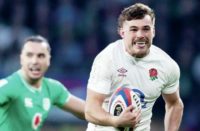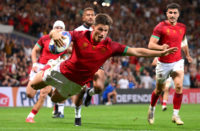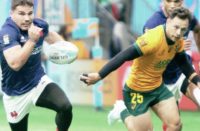 John Carter may look like Sebastien Chabal's younger, wilder, brother and when his battered body can be welded together for 80 minutes he often plays a similar game – but don't be deceived by his ‘caveman' appearance. Psychoanalysis is Carter's field of post graduate research, commonsense is his default setting and a thought-provoking afternoon spent inside Carter's head can opens up an entirely new rugby vista.
John Carter may look like Sebastien Chabal's younger, wilder, brother and when his battered body can be welded together for 80 minutes he often plays a similar game – but don't be deceived by his ‘caveman' appearance. Psychoanalysis is Carter's field of post graduate research, commonsense is his default setting and a thought-provoking afternoon spent inside Carter's head can opens up an entirely new rugby vista.
His words of wisdom aren't yet delivered on tablets of stone but there is more than a whiff of the Old Testament prophet about the former Sale backrower.
We meet in a chaotic boot-room under the dilapidated wooden stand at Iffley Road, a windowless rugby den reeking of embrocation and piled high with old match tapes, DVDS and memories. For much of the season Carter has been out of action following a nasty concussion on Oxford's pre-season tour to South-west France and more recently he has been taping up a couple of busted fingers before his comeback games.
This is completely par for the course for a man whose body has confounded medical science and kept a posse of grateful surgeons in gainful employment.
Captaincy in the broadest, almost holistic, sense is the subject under debate. Captaining the Oxford First XV, heading up a multi-team club, acting as chairman of selectors and recruiting officer and trying to get his young disciples smelling the roses when they are ankle deep in mud on a November night.
As the professional game disappears over the horizon, losing, or at least struggling against massive odds, is becoming is a fact of life for Oxford. This season they have actually won five of their 12 games but last season saw just two victories before their triumph over Cambridge at Twickenham. Defeat needs to be somehow embraced.
“If you look at life in terms of winning and losing then we are all losers,” says Carter with a rather chilling logic that discourages debate. “At the end of it we all lose but with this club every day is a new experience with each other and we aim to get the most out of that experience. When I came into the game here there were aspects of the professional game that I was particularly disillusioned with.
“There was a lack of a sense of shared experience with other people relative to the importance of winning. Everything was down to winning or losing. That didn't involve belief. At Oxford there has been an opportunity for personal development, academically, emotionally and spiritually in terms of the rugby. Allowing and encouraging expression from everyone brings something to a group that isn't just about winning or losing.
“I was disappointed with the pro game because it didn't take that initiative. If players aren't managed on a personal level, as well as being an asset of the club, then you lose out. Every club has that opportunity. If you create an environment in which people can flourish in all aspects of life then you will get the best rugby players.

“It is not just about being the strongest athlete who is only concerned about winning, or being the player with the biggest ego. Rugby teams perform best and get the most enjoyment when they play together.
“It's much more than training together or working out in the gym. You have to generate a belief in and respect for the person who plays next to you. You need to build on what it means to be human. The more human you can make your team the more powerful it can become.
“When it comes down to the really high pressure moments in a game, or in any walk of life, part of you wants to run away from it. The defensive part of you goes off inside yourself and you become an individual. If you can create a team that supports you, that can be overcome.” Heady stuff and probably best digested over a thoughtful Sunday morning coffee rather than a belly full of post-match ale and chicken vindaloo. Isn't the Varsity match, no matter what the standard, meant to be one of the most bitterly competitive sporting occasions in the calendar?
“Success isn't wholly based on the scoreline,” argues Carter. “That is a misunderstanding and a misconception of this Varsity game in particular. A lot of people see it simply as a win or lose situation. When I get to December 11, the day before the Varsity Match, that's when I can deem whether a large part of what we have done has been a success or not.
“The scoreline is obviously important, but it is not the only victory. It is a driving factor, but it has to be integrated with the team building. The emphasis for me is based more on the sense of a shared experience. I would be lying if I said I didn't get any satisfaction from winning games like these and some ego from statistical gain. But relative to what we are going through, it doesn't mean anything to me at the moment.”
Carter was a pupil at Shrewsbury School where the school motto Intus se recte ne labora – if right within, trouble not – sums up his game-plan perfectly while after school it was onwards to
Nottingham University combined with spells as a professional rugby player at Doncaster and Sale. At the latter, along with Chabal and Luke Abraham, he formed part of probably the hairiest backrow in history but a succession of vicious injuries, mainly shoulder, cut short his career in the top flight.

Since arriving at Oxford to study at Kellogg College he has, despite not ‘chasing' victory, played in three winning teams on the bounce and on Thursday could become the first Varsity captain to lead his side to three wins. Funny that. Just as life is often famously what happens when you are busy making other plans, winning is sometimes what happens when you are busy enjoying other stuff.
“All this fits very nicely with my particular field of study,” concedes Carter. “With psychoanalysis practice, self-reflection is a big part of it. Everything is a case study, even this conversation with you. One of the things I really wanted to do when I became captain was a one-to-one communication with every player throughout the season. I've done that for the last three years. I don't want to batter the pro-game all the time, but some of the management there was less than wonderful. You have ex-rugby players managing up to 50 people. One of the things I found players most disheartened with was not being spoken to and not being told straightforwardly and honestly where they sat and what they needed to do.
“Some managers find it difficult to have that confrontation when they are dropping players but that is one of the most important parts of managing a large squad. I see it as a huge part of my job to communicate to the players where they stand. Honesty is one of the most important parts of our season.”
The proof of that particular pudding came last Tuesday when Carter set up camp at the back of the Grand Cafe Oxford, where Samuel Pepys, among others, used to hang out, and spent the day telling all 29 of his extended first team squad, one-by-one and face-to-face, whether they had been picked for Thursday's match. A coffee marathon of highs and lows with one of the most difficult decisions being whether to pick himself after his limited game-time.
“I've always said the players pick the team and any issues are always discussed. Similarly any player can captain this team, from 18-year-old undergraduates to more seasoned performers. It's not the tactical appreciation that is vital, it's if people trust and believe in them.
“The reason I've carried on doing the captaincy is that it gives back so much life and allows me to connect with so many people. It has been a truly unbelievable experience. You struggle to find this in any other sphere of life. If we get it right then it feels as though life is really mysterious and magical. I will really miss it when it's gone.”
Some will scoff but, because Carter has both the intellect and rugby nous to consider the question deeply, he articulates what many others recognise as the true magic of rugby as both a sport and quasi-lifestyle.
When the knees and back have gone and you are reduced to a camp follower it's not the wins and losses that you revisit first when tripping down Memory Lane it's the good times, that brief feeling of physical invincibility and just bashing around the pitch and life generally with your mates. That's what endures, that's the victory Carter talks about.
As his loyal lieutenant James ‘Bomber' Harris, formerly a steely professional with Wasps, Newport Gwent Dragons and Wales Sevens explains: “This experience under John's captaincy has changed my views on rugby. It continually amazes me the desire we have within the group to go above what is expected of us. It has been refreshing playing rugby in its purest form, that has really ignited in me again.”
Oxford University: J Taylor (Keble/Canberra Grammar School); HJJ Hughes (Magdalen/Peter Symonds College), MDL Janney (Oriel/King's College School, Wimbledon), GM Turner (Kellogg/ King Edward V1, Southampton), HH Lamont (New/Cranleigh); JA Hudson (Lincoln/International School, Geneva), SMJ Egerton (Keble/Adams Grammar School); LR Anderson (Trinity/Bexley Grammar School), NJ Gardner (Lincoln/Magdalen College, Oxford), IM Williams (Kellogg/ Sherborne), MP Rickner (St Anne's/ Stowe), WMC Rowlands (Pembroke/Rugby School), APM Jones (St Catherine's/Eton), JG Harris (Kellogg/Eltham College), JH Carter (Kellogg/Shrewsbury, captain).
Replacements: FJA Heathcote (St Edmund Hall/The Leys), JM Wisson (St Anne's/ Dulwich College), HI Macdonald (Wadham/ Leeds Grammar School), TR Reeson-Price (St John's/Eastbourne College), GA MacGilchrist (University/George Watson's College), MF Shorthose (University/RGS, Guildford), AP Macdonald (St Peter's/ Bishops, Diocesan College, Cape Town), EJE Doe (Kellogg/Cathedral School, Llandaff), PJ Olivier (Keble/Rondebosch HS, Cape Town).
Cambridge University: T May (Homerton/Skinners School); N Jones (Selwyn/Auckland Grammar School), C Morrison (Hughes Hall/Dollar Academy), KLH Cook (Hughes Hall/Queen Elizabeth's Hospital School, Bristol), AW Murdoch (Hughes Hall/King's School, Grantham); D Stevens (St Edmund's/Grey College, Bloemfontein), H Peck (Homerton/Bedford School); WTE Briggs (Magdalene/Bedford School, captain), T Pascoe (St John's/Truro School), FWB Sanders (Magdalene/Oundle School), S Annett (Clare/Methodist College, Belfast), J Baker (St John's/Woodhouse Grove), MW Mather (Downing/KCS Wimbledon), A Smith (Churchill/Christ's College, Christchurch), S Farmer (Wolfson/ Bedford School).
Replacements: P Calvert (St John's/Down High School), W Yeeles (Robinson/ Cranleigh), S Alderson (Caius/Denstone College), N Viljoen (Jesus/The Leys), C O'Sullivan (Homerton/Midleton College, Cork), STE Tullie (Emanuel/Bradford Grammar School), AJ Abraham (St Edmund's/RGS Lancaster), J Boyd-Moss (Fitzwilliam/St Andrew's College, Grahamstown).

























